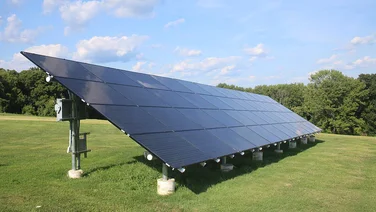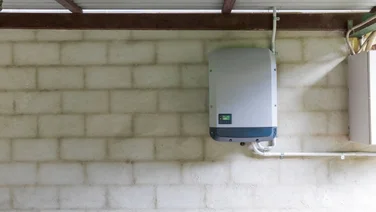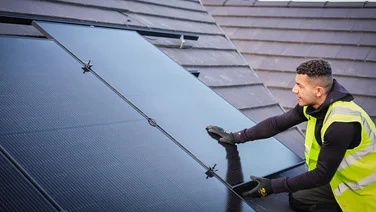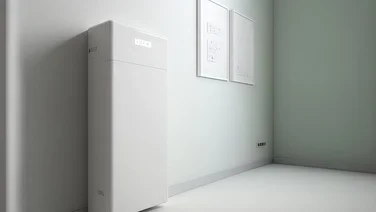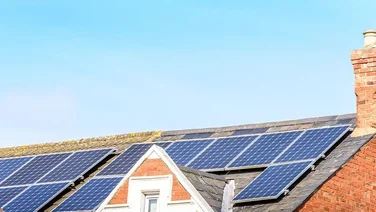We receive a small fee from trusted installers when you request a quote through our site. This helps us keep our content independent, well-researched and up to date – Learn more
- Myth: Solar panels are too expensive
- Myth: Solar panels only work when it’s sunny
- Myth: Solar panels are difficult to maintain
- Myth: Solar panels decrease your property’s value
- Myth: Solar panels do more harm than good to the environment
- Myth: Solar panels are a threat to agricultural land
- Myth: Solar panels are ugly
- Myth: Solar panels don’t last that long
- Myth: There is no financial help for solar panel installation
- Summary
- Solar panels cost around £8,400 on average
- Solar panels only need cleaning roughly once every 10 years
- Solar panels can raise a home’s value by around 4.1%
There are many reasons solar panels have become one of the world’s most popular renewable tech – namely, because it’s the cheapest energy source in the world and a key tool in reducing fossil fuel emissions and combating climate change. It also helps that solar panel prices continue to fall and government grants for solar panels are there to help with the upfront cost.
Despite solar’s success in the energy industry, there are still some myths floating around that need debunking – and we’re here to do just that. The first you need to think about is how solar power works.
If you think your property could benefit from solar panels, we can help you with that too. All you have to do is add some quick details to our easy-to-navigate tool, and one of our expert installers will be in touch with free quotes for you to compare.

Myth: Solar panels are too expensive
Reality: The price of solar panels has fallen by 80%
Solar panels have historically been too expensive for most households. However, the cost of solar panels has fallen by over 80% since 2010, and today, homeowners can expect to pay up to £8,302 for solar panels, according to the latest figures from the MCS, with the average three-bedroom house usually requiring a system that costs around £7,026.
This is still expensive for a lot of households – but solar panels are far more affordable than they used to be, and are predicted to continue falling in price. For example, solar panels cost £9,994 on average in 2023.
Plus, homeowners can typically make this money back within 15.66 years. To compare, it would have taken over 20 years to make your money back a few short years ago. This is because electricity has become much more expensive, and solar panels typically cut a property’s electricity bills by around 70%, resulting in annual savings of £454 for the average three-bedroom property.
Solar panels also usually last at least another 10 years after this break-even point, which means the average household will end up with at least £5,043 in energy bill savings and Smart Export Guarantee revenues over the solar panels’ lifetime.
Myth: Solar panels only work when it’s sunny
Reality: Solar panels can work even when it’s snowing
Solar panels are pretty self explanatory – they literally convert the sun’s solar energy into electricity. But this doesn’t necessarily mean they only work in direct sunlight.
Don’t get us wrong, they’re most efficient when they absorb direct sunlight, but they still produce electricity when it’s cloudy, rainy, or if part of the panel is in shade. They just won’t be efficient.
On average, light cloud cover will lead to a power output loss of 23.8%, while heavy cloud cover will reduce output by 66.8%, according to the latest figures.
Solar panels even work in light snowfall.
Myth: Solar panels are difficult to maintain
Reality: Solar panels only need to be serviced once a year
Solar panels are actually pretty low-maintenance pieces of equipment, since they have no moving parts.
The main thing homeowners need to do is keep their solar panels clean – and this only needs to be done about once every ten years.
Homeowners need to remove any dust or pollen from the panels in the summertime, and look out for any snow or debris during the winter months. Keep in mind that you shouldn’t use any type of high-pressure water sprayer when washing off your solar panels, as this can often lead to damage.
To make sure your solar panels stay in tip-top shape, it’s also a good idea to regularly check their day-to-day performance, and get them serviced roughly once a year.
Want to learn more? Head to our solar panel maintenance page.
Myth: Solar panels decrease your property’s value
Reality: Solar panels can actually increase your the value of your home by 14%
Worried that solar panels will hinder your home’s performance on the market? Well, they’re actually likely to do the opposite.
Solar panels can actually increase the value of your home by 14%, according to a recent study by home improvement experts, BOXT.
A further study by real estate company, Solar Energy UK also found homes would increase in value by 0.9%-2% on average.
And it makes sense when you think about it. After all, it means potential buyers can benefit from solar energy without having to invest thousands of pounds for the upfront costs.
Want to learn more? Head to our page: Do solar panels increase the value of your home?
Myth: Solar panels do more harm than good to the environment
Reality: Solar power’s carbon footprint is a fraction compared to that of oil
Solar panels source one of the cleanest forms of energy on the planet. Unlike fossil fuels, they don’t release any greenhouse gases whilst operating, and can be used to power homes, towns, and cities.
They can even reduce a home’s carbon footprint by around one tonne of CO2 per year, depending on where you live.
Admittedly, there are also a handful of negative environmental factors of solar panels, including:
- Some hazardous materials are used to create them
- Where they’re manufactured
- How far they need to be shipped from
- How they’re disposed of
- How they impact land use
But just how harmful are solar panels? Well, the carbon footprint of an average solar photovoltaic (PV) system is between 14–73 grams of carbon dioxide equivalent (CO2e) per kilowatt-hour (kWh) – pretty harmless compared to the average 742g of CO2e released per kWh when burning oil.
And if solar panel owners want to make their panels completely carbon neutral (meaning they balance out any CO2 they release into the atmosphere by removing the same amount), they only need to have them for at least three years. After three years of use, a solar panel’s overall carbon footprint drops into the negatives, as it will have prevented more emissions from being released into the atmosphere than it took to create itself.

Myth: Solar panels are a threat to agricultural land
Reality: Solar projects take up less than 1% of UK land
Former prime ministers Liz Truss and Rishi Sunak have both claimed in the past that solar panels take up t the UK’s high-quality farmland. This has also been echoed by various other Conservative MPs, who have described solar projects as hazards for rural communities and food supply.
This myth couldn’t be further from the truth.
In reality, solar panels currently take up just under 0.1% of land in the UK, according to 2024 research by Solar Energy UK. This is minuscule compared to the 70% of land that agriculture covers.
In fact, existing solar farms currently use less land than all UK golf courses and airports put together.
And why do we have to choose between one or the other? We can have the best of both worlds by combining agricultural land and solar farms, to create what’s called ‘an agrivoltaic system’ – a set-up that involves planting crops underneath raised photovoltaic panels.
Some crops need shade to thrive, especially during the summer, which can be provided by the panels whilst they harness the solar energy.
That means whilst some suggest that solar energy is ‘ruining’ valuable farmland, combining the two practices can actually benefit the UK. Farmers can continue agricultural work as usual, whilst also receiving a solar rental subsidy fee of between £850–£1,100 per acre each year.
Myth: Solar panels are ugly
Reality: Solar panels look more discreet than they used to be
When you think of solar panels, do you picture bulky, blue rectangles, protruding unnaturally from the roof? Well, you might be pleased to know that these times are far behind us.
Innovation in the solar panel industry means that most of today’s solar panels have a sleek, elegant appearance.
If homeowners want to make their panels more concealed, they can opt for integrated panels, which position panels in line with the tiles. Or perhaps solar tiles might suit them better, which act exactly like solar panels but are camouflaged as roof tiles.
Myth: Solar panels don’t last that long
Reality: The average solar panel lasts over 30 years
When solar panels first emerged in the domestic market, they were far more basic than the ones we see today – they’re now more visually appealing, more efficient, and last for decades.
The average solar panel now lasts for around 35 years. Homeowners can also get warranties on their solar panel systems – most of which last for up to 25 years – which can reassure them that their panels are here for the long haul.
Myth: There is no financial help for solar panel installation
Reality: There are plenty of schemes designed to help with toe cost of low-carbon tech
With solar panels specifically, technically there are few grants or schemes available. However, there are plenty available for low-carbon tech that you can use to alleviate the cost of solar panels. If you don’t qualify for them, there are financing options available, too.
The most-common grants and schemes are:
- Solar Together: A group-buying initiative that allows communities to buy solar panels for their homes at a competitive price
- 0% VAT: Homeowners will pay 0% VAT on solar panels and other energy-saving materials until April 2027, rather than 5% previously
- ECO4: Funding for energy-efficient retrofits to fuel-poor households, or ones with occupants on certain benefits
- ECO Flex: Part of the ECO4 scheme, ECO Flex extends eligibility criteria to households referred to the scheme by their local authorities or energy supplier
- The Home Upgrade Grant (until March 2025): This grant is no longer accepting new applications, but was previously designed for households not connected to the gas grid in 45 select local authorities to receive up to £10,000 in funding for solar panels
- Warm Homes Local Grant: Eligible households in England with an annual income under £36,000 and an EPC rating of D to G can receive up to £30,000 for energy efficiency upgrades, including insulation, solar panels, glazing, and heat pumps.
Summary
- Homeowners can expect to pay up to £8,302 for solar panels
- The main thing homeowners need to do to maintain their solar panels is keep them clean
- Solar panels can actually increase the value of your home by 14%
- Solar panels can even reduce a home’s carbon footprint by around one tonne of CO2 per year
- Solar panels currently take up just under 0.1% of land in the UK
- Innovation in the solar panel industry means that most of today’s solar panels have a sleek, elegant appearance
- The average solar panel now lasts for around 35 years
- There are plenty available for low-carbon tech that you can use to alleviate the cost of solar panels
- To speed up the process, use our free, custom-built tool. Just provide a few quick details about your property, and we’ll put you in touch with our expert solar suppliers, who will provide you with quotes to compare


